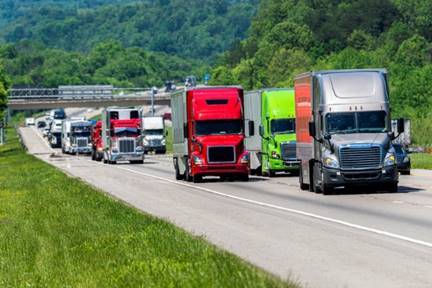Trucking Industry Key to Evaluating Fuel Tax Alternatives, New Study Finds

The Eastern Transportation Coalition completes nation’s first multi-state mileage-based user fee truck pilot, seeks participants for October 2020 truck pilot
Understanding the unique demands of the trucking industry is key to evaluating fuel tax alternatives, according to a newly published study from the Eastern Transportation Coalition (the Coalition), a partnership of 17 states and the District of Columbia that connects public agencies across modes of travel to increase safety and efficiency.
The Coalition’s pilot study, conducted between October 2018 and March 2019, included more than 50 tractor-trailers traveling more than 1.4 million miles across 27 states and provided a close look at how a mileage-based user fee (MBUF) model would affect the trucking industry.
Mileage-based user fees charge motorists for their road use instead of the amount of fuel they purchase. This model is seen as a possible alternative to state and federal fuel taxes, which are experiencing declining revenue due to inflation, improved fuel efficiency, and a changing vehicle fleet. Previous MBUF studies have largely focused on passenger vehicles.
“With such robust debate taking place about the viability of MBUF, we are excited to share our findings about how MBUF will affect some of the transportation system’s most important users and funders – trucking companies,” said Patricia Hendren, executive director of the Coalition. Though neutral on whether such a model presents the ultimate answer to the fuel tax conundrum, the Coalition believes evaluating these fees in real-world scenarios is central to finding a sustainable solution. Technology and research partner EROAD guided the pilot design and supplied reliable, accurate data from the vehicles involved in the study.
Results from the study highlighted the ways a one-size-fits-all approach to MBUF could unfairly impact motor carriers by failing to consider the industry’s unique circumstances.
“Accounting for the complex differences between tractor-trailers and passenger vehicles in terms of vehicle size, usage, regulatory requirements, and fuel efficiency should be a foundation for further study of MBUF,” Hendren said. “Any future transportation funding approach needs to take into account the full picture of the transportation taxes and fees paid by the trucking industry.”
The Coalition’s five major findings from the newly published study (listed below) are further explained in the full report available on the Coalition’s MBUF website:
- Bringing the trucking industry’s voice to the table in MBUF discussions is essential.
- Trucks cannot simply be treated as big cars in an MBUF system.
- Existing regulations provide guidance for MBUF implementation.
- One rate for all trucks doesn’t work.
- There is a need for further education and outreach.
John Lyboldt, President of the Truckload Carriers Association (TCA), concurs with the need for more research. “TCA is pleased to see that the Eastern Transportation Coalition’s new study has produced much-needed multistate data on the viability of a mileage-based user fee for the trucking industry,” Lyboldt said.
“This study is a good first step, and we agree with the Coalition’s report that additional data is still needed before any nationwide policy on MBUF can be pursued,” Lyboldt added. “We hope that the Coalition’s work will provide a signal to federal policymakers that it is premature to start transitioning to a new revenue collection model and that significant questions must be addressed regarding MBUF implementation, especially for the trucking industry, before moving forward.”
Some parts of the motor carrier industry view MBUF with caution, noted Todd Spencer, President & CEO of Owner-Operator Independent Drivers Association (OOIDA).
“While many OOIDA members remain skeptical of transitioning away from traditional user fees to a MBUF approach, the reality is many federal and state lawmakers and transportation officials are considering these systems as a means to fund our highway infrastructure in the future,” Spencer said.
“We appreciate the Eastern Transportation Coalition’s sincere desire to fully engage the trucking industry to better understand motor carriers’ serious apprehensions with MBUF proposals, including concerns about fairness, privacy, security and regulatory hurdles,” Spencer added. “We are grateful the Coalition’s latest report accurately reflects many of these concerns, which are often overlooked or ignored by other organizations exploring MBUF. Our goal has always been to ensure highway user fees are fair and equitable, and collected in a manner that minimizes the burdens on our members.”
Bill Sullivan, Executive Vice President for Advocacy for American Trucking Associations, noted the importance of including the trucking industry in MBUF discussions.
“Infrastructure funding drives the future of lives and business, and it’s critical we get this right,” he said. “How we implement fees to pay for roads and bridges will have great impact on the $10 trillion in freight that moves across our country’s roads. The Eastern Transportation Coalition is methodical and systematic about what can work – and what likely can’t – and we will continue to support this comprehensive, data-driven approach going forward.”
The Coalition is seeking participants for its next round of truck-focused pilots, which will be even more expansive than the first. The pilot will include 200 tractor-trailers recording mileage data across the nation over a 6-month period starting October 1, 2020.
Category: Driver Stuff, Featured, Fuel & Oil, General Update, Management, News, Vehicles










